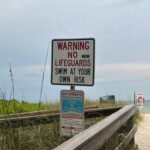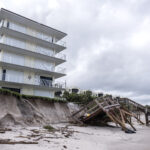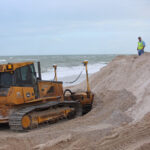VERO BEACH — At the recent Barrier Island Coalition banquet, the politics of sand was on the minds of the nearly 100 people — about 20 of them current or former elected officials — listening to the speeches and award presentations.
Coalition Chairman Bill Glynn, who emceed the program, said beach restoration and the dedicated people who have fought for it and worked on it will keep Vero Beach from becoming “Vero Seawall.” “Our barrier island has 10 percent of the population and 4 percent of the infrastructure and that 4 percent is the beaches,” Glynn said. “And the 10 percent of the population we have pays 41 percent of the ad valorem (property) taxes.”
On behalf of members of about 30 barrier island organizations, Glynn presented Outstanding Citizen Awards to Rep. Ralph Poppell (who was absent due to the legislative session), who helped grease the regulatory wheels in Tallahassee for the experimental, large-scale use of upland sand, and to Commissioners Peter O’Bryan and Joe Flescher, who have crusaded for the upland sand project.
O’Bryan’s focus has been on breaking through onerous scientific and environmental barriers and busting up the off-shore sand monopolies to reduce the cost of beach restoration for the taxpayers.
Flescher has pushed to keep the money local to provide temporary but high-paying construction and trucking jobs for 100 or so of the county’s unemployed.
No one during the ceremonies mentioned that the project continues to have mounting costs and delays. The question of whether the use of upland sand will ultimately cost less and make sense in future restoration project appears to be far from clear.
Flescher and O’Bryan cheerfully accepted the honor as potential campaign supporters from the financial, real estate and business community looked on – and they need that support.
Both are engaged in heated Republican primary races to keep their seats on the county commission. O’Bryan cited statistics of $750 million in market value of property within the Sector 3 replenishment zone and an estimated $9.8 million in tax revenue to the county, showing that he’s studied the political demographics of sand.
“We’re all working hard to bring the project to completion. It’s a team effort,” O’Bryan said in his acceptance speech, giving kudos to county staffers and to the Sebastian Inlet Taxing District.
County Administrator Joe Baird and the county public works director were there to show their support, as well as Marty Smithson of the Sebastian Inlet Taxing District, which contributed $4.68 million to help fund the project as part of their required efforts to mitigate erosion caused by the inlet’s jetties.
Glynn, who also chairs the Indian River County Beaches and Shores Preservation Committee, said the Barrier Island Coalition does not endorse, but only recommends candidates, and that they wait until qualifying closes to do so.
In regard to the north beach sand project — which is costing county taxpayers nearly $15 million to date – he characterized it as a “win-win” for the barrier island.
Glynn suggested that residents who have been waiting to get their sand for more than six years should be “dancing in the streets” as they are now receiving 317,000 cubic yards of high-quality material to shore up their oceanfront property.
“We were on the verge of losing some very expensive property and ruining peoples’ lives,” Glynn said of those pockets of beach that were severely eroding.
Keynote speaker Rep. Bill Posey, though not directly involved in restoring the area’s beaches, received the final of four awards for his conservative stands on many issues ranging from healthcare reform to cap-and-trade energy policy.
“It doesn’t take a rocket scientist to figure out that if we don’t protect our beaches, the Keys will be in Gainesville,” Posey said to the group of local dignitaries assembled in the banquet room at the newly renovated Surf Club resort on S.R. A1A.
Other speakers included local financial advisor and Coalition member Bob Anderson, who stated that residents in the north county beach project are going to have some of the “best-quality sand” possible when the project is completed.
County Coastal Engineer James Gray also informed the audience that the first leatherback turtle nest had been found in the new sand that has been put on the beaches.
This is hopeful news, since the success of the upland sand as turtle-nesting habitat will determine the viability of using it in Phase Two of the project next winter.
Though sand miners and Ranger Construction, the contractor on the project, have been working seven days a week to catch up, the beach replenishment project is still running weeks behind.
The final two weeks remaining will see a tight squeeze to get every last area — including Baytree and Marbrisa, which are set to be the final beaches completed – renourished prior to the April 30 deadline.






